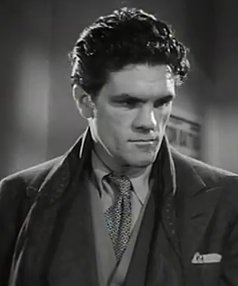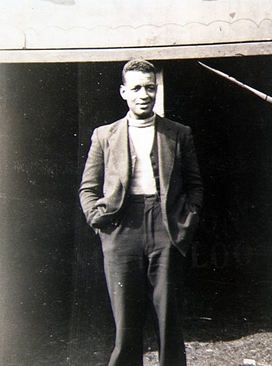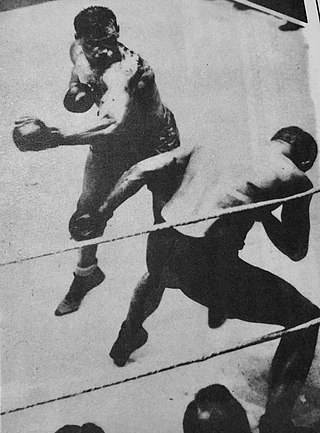Related Research Articles
Benjamin Lynch was a Scottish professional boxer who fought in the flyweight division. He is considered by some to be one of the finest boxers below the lightweight division in his era and has been described as the greatest fighter Scotland ever produced. The Ring Magazine founder Nat Fleischer rated Lynch as the No. 5 flyweight of all-time while his publication placed him 63rd in its 2002 list of the "Best Fighters of the Last 80 Years". Like Fleischer, both Statistical boxing website BoxRec and the International Boxing Research Organization also rank Lynch as the 5th greatest flyweight ever. He was elected to the Ring Magazine hall of fame in 1986 and the International Boxing Hall of Fame in 1998.

Frederick Percival Mills was an English boxer, and the world light heavyweight champion from 1948 to 1950. Mills was 5 feet 10+1⁄2 inches (179 cm) tall and did not have a sophisticated boxing style; he relied on two-fisted aggression, relentless pressure, and the ability to take punishment to carry him through, and in more cases than not these attributes were sufficient.
Terry Downes, BEM was a British middleweight boxer, occasional film actor, and businessman. He was nicknamed the "Paddington Express" for his aggressive fighting style.
Terry Allen was an English flyweight boxer. During his career, he became British, Commonwealth, European and World flyweight champion.

Pat O'Keeffe, was a professional English boxer who became the British champion in both the welterweight and middleweight weight classes. His professional career spanned the years between 1902 and 1918. In 1914 he made an unsuccessful bid for the European heavyweight belt, losing to Georges Carpentier. Between 1907 and 1910 he left Britain and continued his boxing career in the United States, and then Australia. On the outbreak of World War I he joined the British Army to work as a Physical Training Instructor (PTI) and Recruiting Sergeant for the 1st Surrey Rifles. He won the Lonsdale Belt outright when he defeated Bandsman Blake at the National Sporting Club (N.S.C) on 28 January 1918, becoming British Middleweight Champion.
Bert Kirby was an English flyweight boxer, who became British flyweight champion in 1930.
Ali Forbes is British former boxer who was British super middleweight champion in 1995 and fought for the World Boxing Federation light heavyweight world title in 2000.

Leonard Benker Johnson, known simply as Len among his admirers, and dubbed "Len Johnson" by the press, was a British boxer who competed from 1920 to 1933. He held the British Empire middleweight title, the first non-white boxer to hold a major title during the British colour bar era, de facto reigning from 20 February 1926 to 12 July 1926. He also held the Northern Area championships at middleweight and light-heavyweight, respectively. A strategic and intelligent boxer, Johnson was considered to be one of the best middleweights of his era. He was known for his exceptional boxing skill, using an educated left-hand, as well a slippery defence that made him difficult to hit, while leaving his features largely unmarked throughout his thirteen-year career. Additionally, Johnson possessed a very long reach and rather good height.
Alex Laurell Buxton was an English boxer who was British light-heavyweight champion between 1954 and 1955.

Jim Sullivan was a British boxer who was British middleweight champion between 1910 and 1912. He went on to challenge for the European title.
John Harrison was a British boxer who was British middleweight champion in 1912.

Augustus T. Platts was a British boxer who was British and European middleweight champion.
John Fleming (1900–1961), better known as Johnny Brown and sometimes as Hamilton Johnny Brown, was a Scottish boxer who was an amateur champion at featherweight and British welterweight champion in 1925.
Henry Owens, who fought under the name Jake Kilrain, was a Scottish boxer who was British welterweight champion between 1936 and 1939.
Ron Barton was a British boxer who was British light-heavyweight champion in 1956 and also fought for the commonwealth title.
Bobby Arthur is a British former boxer who was British welterweight champion between 1972 and 1973.
Jimmy Revie is a British former boxer, who held the British featherweight title between 1969 and 1971, and unsuccessfully challenged for the European title in 1971.
Ngozika Ekwelum is a Nigerian former heavyweight boxer, who held the Nigerian and African Boxing Union heavyweight titles in the 1970s and 1980s.

Pierre Charles was a Belgian boxer who was the heavyweight champion of Belgium and Europe. He held the Belgian title between 1926 and 1927, and again between 1935 and 1936, and the International Boxing Union (IBU) European title for three periods, from 1929 to 1931, 1932 to 1933, and 1935 to 1936.

Hein Müller was a German boxer, who was a champion of Europe as both an amateur and a professional. He won German amateur titles at three weights, was European amateur champion at light heavyweight, and as a professional won the German and European heavyweight titles.
References
- ↑ The forgotten history of Bunny Sterling, a skilled fighter and pioneer in the face of ignorance and prejudice
- 1 2 3 "Warrant Out for Boxing Champion" . Aberdeen Evening Express. 24 February 1971. Retrieved 7 January 2018– via British Newspaper Archive.
- 1 2 "Sterling Is British - Official" . Coventry Evening Telegraph. 20 October 1970. Retrieved 7 January 2018– via British Newspaper Archive.
- ↑ "Bunny Sterling..." . Coventry Evening Telegraph. 4 December 1969. Retrieved 7 January 2018– via British Newspaper Archive.
- ↑ "Williams Gets a Draw - But Thomas Refuses to Rush" . Coventry Evening Telegraph. 12 May 1970. Retrieved 7 January 2018– via British Newspaper Archive.
- ↑ Goodman, Alex (8 September 1970). "Boddington Set for Win Return" . Coventry Evening Telegraph. Retrieved 7 January 2018– via British Newspaper Archive.
- ↑ "Sterling Wins British Title" . Coventry Evening Telegraph. 9 September 1970. Retrieved 7 January 2018– via British Newspaper Archive.
- 1 2 "Sterling Wins on Points" . Aberdeen Evening Express. 23 March 1971. Retrieved 7 January 2018– via British Newspaper Archive.
- ↑ "Bunny Sterling Keeps Title" . Aberdeen Press and Journal. 22 January 1971. Retrieved 7 January 2018– via British Newspaper Archive.
- ↑ "Boxing Champion Fined £38" . Coventry Evening Telegraph. 6 April 1971. Retrieved 7 January 2018– via British Newspaper Archive.
- ↑ "Sterling Wins" . Birmingham Daily Post. 28 April 1971. Retrieved 7 January 2018– via British Newspaper Archive.
- ↑ "Sterling Wins But Veteran Luis is a Flop" . Birmingham Daily Post. 26 May 1971. Retrieved 7 January 2018– via British Newspaper Archive.
- ↑ "Sterling Beats Bogs on Points" . Birmingham Daily Post. 22 October 1971. Retrieved 7 January 2018– via British Newspaper Archive.
- ↑ "Sterling Aims for World Title Fight" . Coventry Evening Telegraph. 20 December 1971. Retrieved 7 January 2018– via British Newspaper Archive.
- ↑ Bailey, Sid (21 December 1971). "Unlucky 13? Ask Bunny Sterling" . Aberdeen Evening Express. Retrieved 7 January 2018– via British Newspaper Archive.
- ↑ "Sterling Retains Title With KO" . Birmingham Daily Post. 20 September 1972. Retrieved 7 January 2018– via British Newspaper Archive.
- ↑ Marquis, John (11 June 1975). "Sterling Back as Champ" . Aberdeen Press and Journal. Retrieved 7 January 2018– via British Newspaper Archive.
- ↑ Marquis, John (27 November 1976). "Britain's Forgotten ex-Champ: Fighter That Nobody Wants to Know" . Aberdeen Evening Express. Retrieved 7 January 2018– via British Newspaper Archive.
- ↑ "Sterling Loses" . Aberdeen Evening Express. 4 November 1977. Retrieved 7 January 2018– via British Newspaper Archive.
- ↑ "Bunny Sterling, Caribbean-born champion who paved the way for other Black British boxers to flourish in the sport – obituary". The Telegraph. 23 November 2018. Retrieved 23 January 2021.